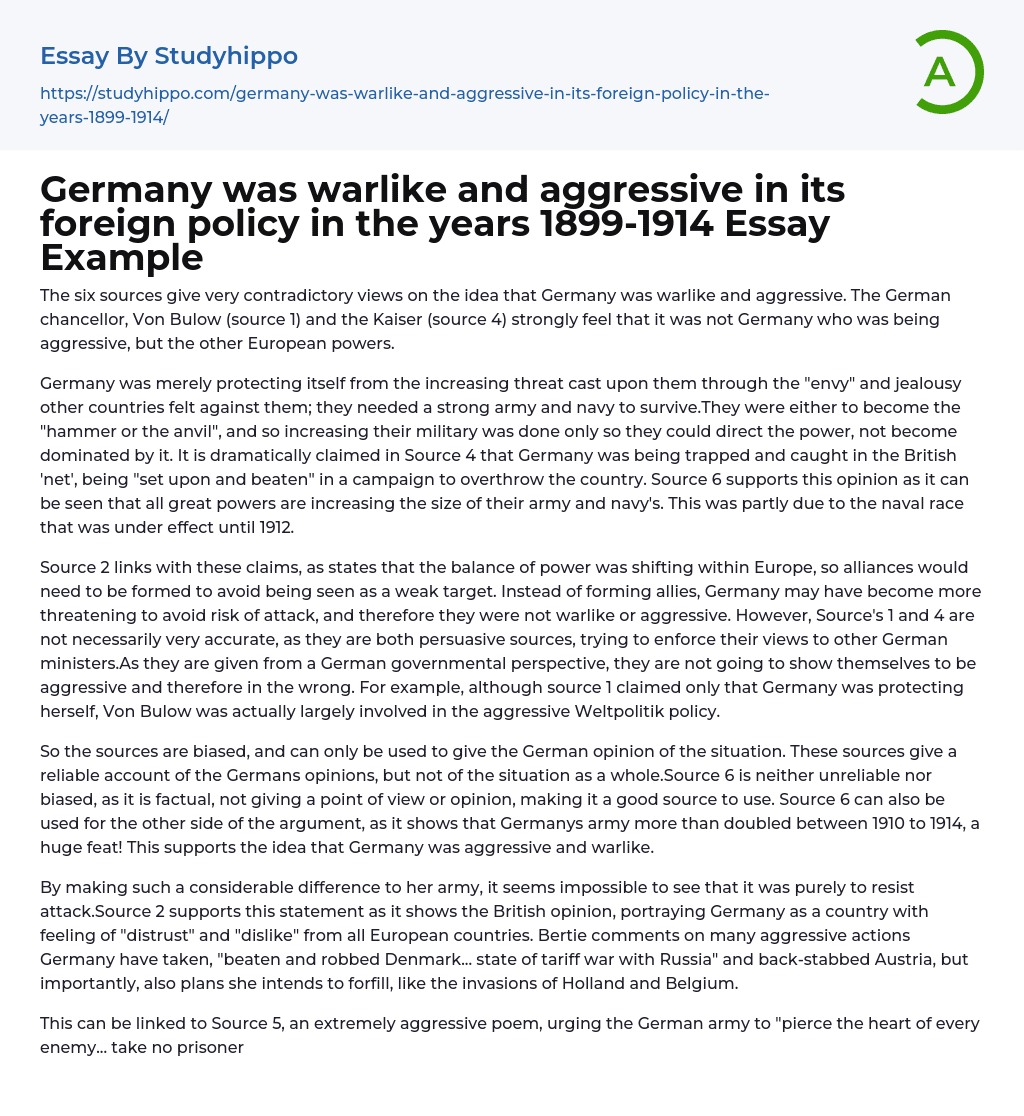

Germany was warlike and aggressive in its foreign policy in the years 1899-1914 Essay Example
The six sources give very contradictory views on the idea that Germany was warlike and aggressive. The German chancellor, Von Bulow (source 1) and the Kaiser (source 4) strongly feel that it was not Germany who was being aggressive, but the other European powers.
Germany was merely protecting itself from the increasing threat cast upon them through the "envy" and jealousy other countries felt against them; they needed a strong army and navy to survive.They were either to become the "hammer or the anvil", and so increasing their military was done only so they could direct the power, not become dominated by it. It is dramatically claimed in Source 4 that Germany was being trapped and caught in the British 'net', being "set upon and beaten" in a campaign to overthrow the country. Source 6 supports
...this opinion as it can be seen that all great powers are increasing the size of their army and navy's. This was partly due to the naval race that was under effect until 1912.
Source 2 links with these claims, as states that the balance of power was shifting within Europe, so alliances would need to be formed to avoid being seen as a weak target. Instead of forming allies, Germany may have become more threatening to avoid risk of attack, and therefore they were not warlike or aggressive. However, Source's 1 and 4 are not necessarily very accurate, as they are both persuasive sources, trying to enforce their views to other German ministers.As they are given from a German governmental perspective, they are not going to show themselves to be aggressive and therefore in the wrong. For example, although
source 1 claimed only that Germany was protecting herself, Von Bulow was actually largely involved in the aggressive Weltpolitik policy.
So the sources are biased, and can only be used to give the German opinion of the situation. These sources give a reliable account of the Germans opinions, but not of the situation as a whole.Source 6 is neither unreliable nor biased, as it is factual, not giving a point of view or opinion, making it a good source to use. Source 6 can also be used for the other side of the argument, as it shows that Germanys army more than doubled between 1910 to 1914, a huge feat! This supports the idea that Germany was aggressive and warlike.
By making such a considerable difference to her army, it seems impossible to see that it was purely to resist attack.Source 2 supports this statement as it shows the British opinion, portraying Germany as a country with feeling of "distrust" and "dislike" from all European countries. Bertie comments on many aggressive actions Germany have taken, "beaten and robbed Denmark... state of tariff war with Russia" and back-stabbed Austria, but importantly, also plans she intends to forfill, like the invasions of Holland and Belgium.
This can be linked to Source 5, an extremely aggressive poem, urging the German army to "pierce the heart of every enemy... take no prisoners! , and "slaughter.
.. build a monument of smoking corpses". This view would also have been the feelings felt by the German soldiers in the lead up to war. Although this source is extremely aggressive, it is not very significant or reliable because it has been purposely written
to rally the German soldiers when they are already at war and therefore cannot be blamed for having an aggressive attitude.
Along with source 6, source 3 gives an overall view, showing that there is truth to both sides of the debate; Germany was both looking for peace, and was a warlike country.Germany could be very diplomatic and helpful, but as very tight bargainers, if things did not go their way, this would become "intensely disagreeable", selfish, arrogant, and manipulated all countries against each other. It was this attitude that was seen to be aggressive. As it was written in 1907, this opinion did change in the build-up to war, as the relationships between countries grew stronger and weaker.
So in conclusion, the sources give a mixed opinion about whether Germany was warlike and aggressive, or defensive and peaceful in its foreign policy.
- Elie Wiesel essays
- Nazi Party essays
- Weimar Republic essays
- Holocaust essays
- Adolf Hitler essays
- Concentration Camps essays
- Anne Frank essays
- World War I essays
- World War Ii essays
- Atomic Bomb essays
- American Civil War essays
- Attack essays
- Cold War essays
- Crimean War essays
- Emilio Aguinaldo essays
- Iraq War essays
- Korean War essays
- Nazism essays
- Nuclear Weapon essays
- Philippine Revolution essays
- Trench Warfare essays
- Vietnam War essays
- Western Front essays
- Diplomacy essays
- Emperor essays
- Rwanda essays
- Tribe essays
- Revolutionary War essays
- War of 1812 essays
- Mexican American War essays
- Hitler essays
- The Spanish American War essays
- League Of Nations essays
- Battle Of The Somme essays
- Treaty Of Versailles essays
- Fascism essays
- D-day essays
- Atomic Physics essays
- Atomic Bombings Of Hiroshima And Nagasaki essays
- Electron essays
- African American essays
- African American Culture essays
- American Values essays
- Asian American essays
- Chinese essays
- Ethnicity essays
- Ethnocentrism essays
- German essays
- Han Chinese essays
- Hispanic essays



